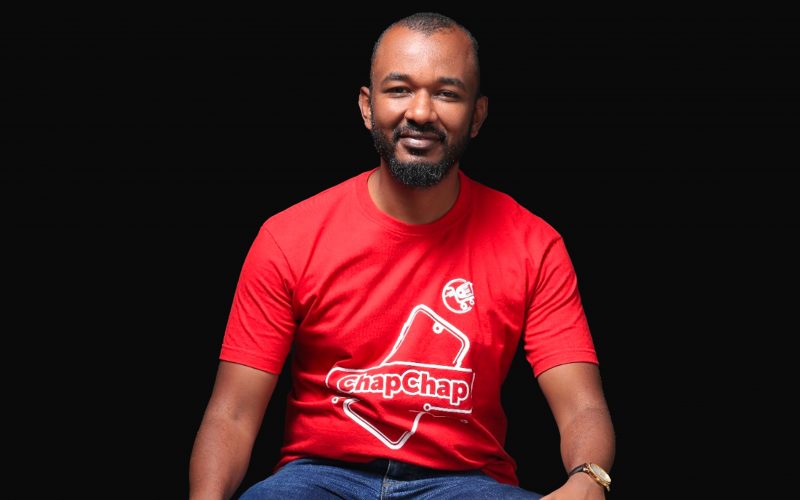By Mark Kawalya
Keeping stock of inventory is crucial for business success. However, many small-to-medium business owners in Uganda use rudimentary record-keeping methods that are tedious and are not viable in the long run. They also face various bottlenecks when dealing with players in the financial service provision sector, which impedes their growth.
An entrepreneur in Kampala teamed up with a classmate and his former primary school teacher to launch ChapChap, a mobile application that empowers SMEs with digital record-keeping tools, giving them access to financial services whilst enabling them to favorably compete in their markets. After he returned from a business trip, we were able to get a sit-down with Emmanuel Emodek, founder of ChapChap who took us on a long and windy journey, of his life story and the events that led to founding the startup. A few minutes after 9 am on a wet Friday morning, he walks into the reception of ChapChap’s Namugongo office to find me waiting for him. He is clad in blue jeans, a polo tee shirt and comfortable trainers. He looks every bit the quintessential tech startup founder who is not burdened by strict corporate world dress codes. He gives me a warm smile as we exchange greetings before inviting me to a seat in his office.
Developing a heart for the people
With the interview underway, he starts me off by painting a lucid picture of what his childhood was like. He grew up in Soroti district with his grandparents for reasons beyond his control. His grandmother ran a successful catering business that she used as a springboard to take in children from less privileged backgrounds and care for them.
“At one time we had almost 100 other children living with us. My granny took as all as her children. There was no discrimination based on skin tone or any physical attributes. ” He says reclining in his leather swivel.
It was against this backdrop of seeing this grandmother positively impact society that shaped Emodek’s own desire to be involved in work that would benefit those around him. One time, a young Emmanuel was in the neighborhood on a rainy day when he came across a young street boy who was shivering in the cold. Emodek took him back home and hid him in his room, where he gave him part of his own food until he was later discovered by his guardians.
As years went by, his grandmother got older and could not take on more children as her energy had waned and she couldn’t keep up with the children.
“My biggest influence to date has been my grandmother.” He says. “She demonstrated to me in practical ways how to live a life that benefits other people. For me, now that I am older, I realise that that is the best way to live your life. ”
Starting his business journey.
Emmanuel had an interest in art and one time a pupil found him drawing a cartoon while in class. He offered to buy the drawing from Emodek, prompting him to draw more cartoons while at home during the night, which he would sell at school. For many young people, making their first shilling is an eye-opener that shows them the immense opportunities and power that come from being able to make their own money. For Emmanuel, this wasn’t any different. After discovering that he could make money if he was creative, he started buying sim sim which he would repackage and resell, making a good margin. All these were crucial lessons that he was learning in entrepreneurship.
He attended Kitante Primary School and later joined Saint Mary’s College Kisubi (SMACK), where he performed well in most of his classes.
The indelible lessons he learned from his grandmother were always wrapped around him like a necklace. One time, his SMACK classmates who had not completed their tuition were to be sent home, as is common practice in many Ugandan schools.
“I rallied other students and convinced them that we should set up a fund that would go towards clearing the tuition balances of the needy students. The idea made a lot of sense and many students embraced it. Soon, other classes adopted the proposal and also began making contributions that enabled more students to stay in school and complete their studies.” He says with a look of contentment.
Moving to Tanzania
After doing his A levels, he made a trip to Tanzania, where he was reunited with his mother after a long time. She had since become a widow and was left with some siblings of Emmanuel that she was raising. She was out of employment, making Emmanuel reconsider whether he should go ahead with his plans to attend university and leave her to fend for herself. He decided to give up his dreams to pursue a university education so that he could find employment in Tanzania and support his mother. After unsuccessfully trying to get a job, the winds of luck blew his way and he was hired as a cabin crew for Air Tanzania.
He soon learned that even with his earnings, he was still not able to fully meet the needs of his family, so he started small businesses that would supplement his income.
Moving back to Kampala, Emmanuel tried his hand at different businesses, which failed because he hadn’t yet mastered the key financial skills that are required to keep a business afloat. He ran a bakery, a barbershop and a restaurant. While running the restaurant, his brother (an accountant) showed him the numbers and explained to him that even though the business was making money, it was not breaking even and would not survive the long term. While money was coming in, the cost of overheads was high, causing shortages when it came to paying other bills, such as rent.
How ChapChap came about.
A friend of his (Malcolm Kastiro, founder of Yassako) visited his restaurant one day and saw how the business was being run. He advised him to start a business that would leverage technology since that was the direction the world was heading in. He told him that the digital space offered many opportunities that were waiting for those that had their eyes open. Emmanuel decided to heed his advice and started brainstorming on a business he could start that met those prerequisites. This is how ChapChap was born.
“I wanted to start a business that would directly benefit the ordinary people in Uganda. After doing some research, I discovered that many Ugandan businesses did not have a record-keeping system that would help them track sales and could be accessed using digital means, ” he says. “Without well-kept records, it is very difficult for a business to determine the overall health of the business as well as keep track of its inventory.”
Emmanuel says that Uganda has the highest number of entrepreneurs not because people love to do business but because most of these people are unemployed and business is their only way to survive. He sees ChapChap, as an instrument that can be used by many of these small businesses to stay afloat. The application can also be used to get credit because it is an active record of daily business transactions that can be used to determine creditworthiness.
ChapChap has so far onboarded 20,000 businesses, most of which are run by youth and women (47%), in more than 33 districts. The application has been adopted more by users in Kampala because COVID-19 restrictions have hampered the firm’s expansion plans to other districts.
“Looking back, I wish I had taken the digital approach to doing business sooner instead of dabbling in so many business ventures that I tried to run using traditional means.” He concludes.








